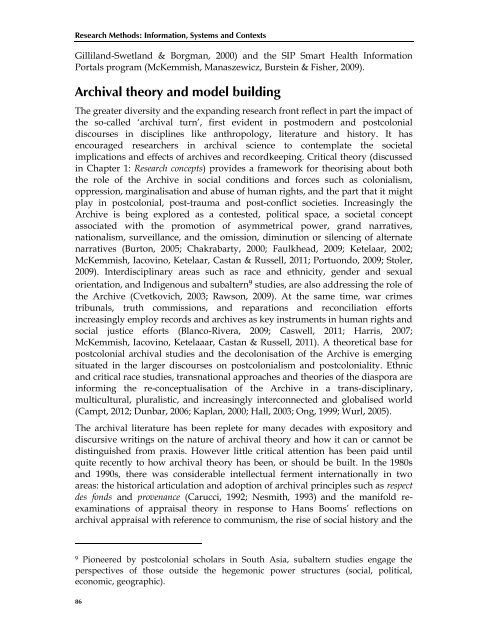Archival and recordkeeping research
Archival and recordkeeping research
Archival and recordkeeping research
You also want an ePaper? Increase the reach of your titles
YUMPU automatically turns print PDFs into web optimized ePapers that Google loves.
Research Methods: Information, Systems <strong>and</strong> Contexts<br />
Gillil<strong>and</strong>-Swetl<strong>and</strong> & Borgman, 2000) <strong>and</strong> the SIP Smart Health Information<br />
Portals program (McKemmish, Manaszewicz, Burstein & Fisher, 2009).<br />
<strong>Archival</strong> theory <strong>and</strong> model building<br />
The greater diversity <strong>and</strong> the exp<strong>and</strong>ing <strong>research</strong> front reflect in part the impact of<br />
the so-called ‘archival turn’, first evident in postmodern <strong>and</strong> postcolonial<br />
discourses in disciplines like anthropology, literature <strong>and</strong> history. It has<br />
encouraged <strong>research</strong>ers in archival science to contemplate the societal<br />
implications <strong>and</strong> effects of archives <strong>and</strong> <strong>recordkeeping</strong>. Critical theory (discussed<br />
in Chapter 1: Research concepts) provides a framework for theorising about both<br />
the role of the Archive in social conditions <strong>and</strong> forces such as colonialism,<br />
oppression, marginalisation <strong>and</strong> abuse of human rights, <strong>and</strong> the part that it might<br />
play in postcolonial, post-trauma <strong>and</strong> post-conflict societies. Increasingly the<br />
Archive is being explored as a contested, political space, a societal concept<br />
associated with the promotion of asymmetrical power, gr<strong>and</strong> narratives,<br />
nationalism, surveillance, <strong>and</strong> the omission, diminution or silencing of alternate<br />
narratives (Burton, 2005; Chakrabarty, 2000; Faulkhead, 2009; Ketelaar, 2002;<br />
McKemmish, Iacovino, Ketelaar, Castan & Russell, 2011; Portuondo, 2009; Stoler,<br />
2009). Interdisciplinary areas such as race <strong>and</strong> ethnicity, gender <strong>and</strong> sexual<br />
orientation, <strong>and</strong> Indigenous <strong>and</strong> subaltern 9 studies, are also addressing the role of<br />
the Archive (Cvetkovich, 2003; Rawson, 2009). At the same time, war crimes<br />
tribunals, truth commissions, <strong>and</strong> reparations <strong>and</strong> reconciliation efforts<br />
increasingly employ records <strong>and</strong> archives as key instruments in human rights <strong>and</strong><br />
social justice efforts (Blanco-Rivera, 2009; Caswell, 2011; Harris, 2007;<br />
McKemmish, Iacovino, Ketelaaar, Castan & Russell, 2011). A theoretical base for<br />
postcolonial archival studies <strong>and</strong> the decolonisation of the Archive is emerging<br />
situated in the larger discourses on postcolonialism <strong>and</strong> postcoloniality. Ethnic<br />
<strong>and</strong> critical race studies, transnational approaches <strong>and</strong> theories of the diaspora are<br />
informing the re-conceptualisation of the Archive in a trans-disciplinary,<br />
multicultural, pluralistic, <strong>and</strong> increasingly interconnected <strong>and</strong> globalised world<br />
(Campt, 2012; Dunbar, 2006; Kaplan, 2000; Hall, 2003; Ong, 1999; Wurl, 2005).<br />
The archival literature has been replete for many decades with expository <strong>and</strong><br />
discursive writings on the nature of archival theory <strong>and</strong> how it can or cannot be<br />
distinguished from praxis. However little critical attention has been paid until<br />
quite recently to how archival theory has been, or should be built. In the 1980s<br />
<strong>and</strong> 1990s, there was considerable intellectual ferment internationally in two<br />
areas: the historical articulation <strong>and</strong> adoption of archival principles such as respect<br />
des fonds <strong>and</strong> provenance (Carucci, 1992; Nesmith, 1993) <strong>and</strong> the manifold reexaminations<br />
of appraisal theory in response to Hans Booms’ reflections on<br />
archival appraisal with reference to communism, the rise of social history <strong>and</strong> the<br />
9 Pioneered by postcolonial scholars in South Asia, subaltern studies engage the<br />
perspectives of those outside the hegemonic power structures (social, political,<br />
economic, geographic).<br />
86


